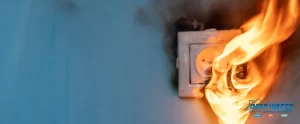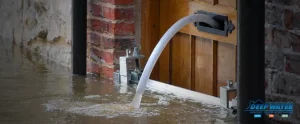Soot is composed of small carbon particles that have been formed by incomplete combustion of fossil fuels like wood, oil, and coal. It is rich in acids, metals, and chemicals, and can attach itself to surfaces or spread to other areas of a house during a fire. If not removed quickly, fire soot can adversely affect your indoor air quality apart from exposing you to various health risks.
Even when there’s no fire, soot can still settle in your home. If this is the case, where does soot come from? For starters, fireplaces that are not properly ventilated can release soot. Furnaces can also cause soot contamination if they create a puffback.
What Does Soot Contain?
Toxic chemical compounds such as arsenic and chromium can be found in soot. A few other elements present in this black or brownish powder are methane, sulfur dioxide, and formaldehyde.
Soot particles are smaller than sand grains, and they have a diameter that is only one-third the size of a human hair strand, although they can be a bit larger than the ordinary home dust. Despite their size, soot particles are harmful; how much soot is dangerous hardly matters, especially for people who are exposed to them.
Dangers Posed by Soot
Health risks after a fire and damage to the property as well as to the surrounding air are some of the common hazards associated with soot exposure.
1. Respiratory Problems
The tiny particles of fire soot are likely to be inhaled by the occupants of a fire-damaged home. These will eventually get into the lungs and cause respiratory infections. This is quite common among people who were exposed to soot for a prolonged period. Often, this can lead to asthma and bronchitis.
2. Asthma Attacks
People with asthma will notice that their condition has gotten worse because soot has affected the quality of the surrounding air. In children, soot inhalation effects include irritation of the throat and lungs, and this has been linked with the development of asthma at an early age.
3. Premature Deaths
Early death is linked to prolonged inhalation of soot. Although soot particles do not directly kill you, inhalation will result in diseases that can prove to be fatal.
4. Cancers
As early as the 18 th century, research has shown a higher incidence of skin cancer among people who regularly sweep their chimneys where soot is usually abundant. Other studies have shown that these people are also at a greater risk for developing lung, bladder, and esophageal cancers.
5. Eye and Skin Problems
A less severe yet unpleasant side effect of soot particles is the irritation of the eyes and the skin. Acid and other chemical elements of soot can cause this. Soot particles can also attach themselves to your clothes, which can result in itching.
6. Property Damage
Apart from the health risks associated with fire soot, damage to belongings can also occur. Soot particles can ruin electronic devices as their metal parts will be eaten up by acid, a common soot component.
This same acid in soot will soften the paint coating in your home wall, causing the surface to turn yellow. Ceilings can also become blackened because of soot.
7. Diminished Air Quality
Soot from fire can seriously affect your indoor air quality. This is because soot particles may have already attached themselves to various surfaces in your home. If you have poor or insufficient ventilation, soot particles can accumulate further, exposing you and your family to greater risks.
8. Cleanup Expenses
Soot can have devastating effects on homeowners, particularly when it comes to cleanup and mitigation costs. The cleanup process is hardly cheap, yet it should be done by professionals, especially if the damage was caused by a fire.
Nevertheless, many homeowners have insurance policies that can cover damage due to a house fire, including its byproducts such as soot, ash, and smoke. In this regard, it is crucial that you document any soot damage resulting from a fire when you file an insurance claim.
How to Clean Soot
Even if a home fire is small and this was put out right away, soot particles can still infiltrate your property through the HVAC system. To reduce the danger of soot exposure, it is important that you restore indoor air quality as soon as possible. For this, you’ll need the help of experts who will use specialized techniques like thermal fogging and air scrubbing to remove soot.
Many items in your house likely contain chemicals that can become harmful when they get into contact with fire soot. These include plastic products, foams, and carpets as well as wood furniture and synthetic fabrics. All of these will need to be cleaned up and disinfected to ensure your safety. Only professionals ca do this as they have the tools, knowledge, and expertise required to remove soot completely.
Key Takeaway
Soot is one of the major byproducts of fire, and it can be dangerous, especially when inhaled. They are known for causing serious health conditions like asthma, lung infection, and cancer. Prolonged soot inhalation can even lead to early death.
However, the health risks after a house fire are not the only problem that soot particles can produce. They can also ruin your house, especially if soot has attached themselves to the wall and to other surfaces. This will mean expensive repairs and mitigation that could eat up a significant portion of your savings. To minimize the effects of soot on your health and on your home, you need to get the services of cleanup specialists immediately.
Contact Deep Water Emergency Services & Mitigation to restore your home damaged by fire and soot.
Getting caught in a fire and ending up with a badly-damaged home can be a devastating experience. Making matters worse is the presence of soot, which can harm you if you get to inhale it.
Deep Water Emergency Services & Mitigation is here to help. Call us immediately and we assure you that our team of fire damage mitigation Denver, CO, specialists will not only restore your property to its pre-damaged state; they will also ensure that soot and other harmful chemicals will be completely removed from your home. Call us now to ensure your safety.






